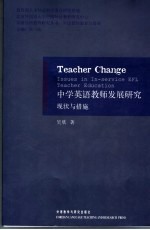

中学英语教师发展研究 现状与措施PDF电子书下载
- 电子书积分:11 积分如何计算积分?
- 作 者:吴欣著
- 出 版 社:北京:外语教学与研究出版社
- 出版年份:2005
- ISBN:7560051308
- 页数:251 页
1 INTRODUCTION 1
1.1 Research Background 1
TABLE OF CONTENTS 1
1.2 China in the Era of Globalisation 2
1.3 Features of Teacher Training in China 4
1.4 Research Questions 6
2 CHANGE AND DEVELOPMENT 9
2.1 The Nature of Change and Development 9
2.2 Changes and Developments of TEFL and TD in China 11
2.2.1 Changes and Developments in Language Teaching Research 11
2.2.2 Changes and Developments in Understanding Language Teachers 21
2.3 Changes and Developments of the English Curriculum in Chinese Middle Schools 37
2.4 Research Issues:Teacher Change and Teacher Development 41
3.2 The Research Paradigm 43
3.2.1 Positivism or Phenomenology 43
3 RESEARCH PARADIGM AND RESEARCH DESIGN 43
3.1 Introduction 43
3.2.2 Science and Relativism 44
3.2.3 Research Issues of the Study 45
3.3 The Research Methodology 47
3.3.1 Quantitative Data and Qualitative Data 47
3.3.2 Methods of Data Collection 49
3.3.3 Action Research in This Study 56
3.4 The Research Design 58
3.4.1 Research Participants 58
3.4.2 The Three Phases of the Study 59
4 PRIMARY THEMES OF TEACHERS' KNOWLEDGE/BELIEFS THE FIRST PHASE(A):Inquiry Description 61
4.1 Introduction 61
4.2.1 The Issue of Inquiry 63
4.2 Inquiring into Teachers'Understanding of TEFL 63
4.2.2 Sources of Data 64
4.2.3 Methodological Problems 69
4.3 Main Themes of Chinese English Teachers'Knowledge and Beliefs 70
4.3.1 Three Domains of Teachers'Knowledge and Beliefs 71
4.3.2 Five Themes of the Research in the First Phase 72
5 PRIMARY THEMES OF TEACHERS' KNOWLEDGE/BELIEFS THE FIRST PHASE(B):Issues and Discussions 73
5.1 Introduction 73
5.2 Teachers'Views on the Subject of English 74
5.2.1 The Status of English Language Teaching 74
5.2.2 The Purpose of English Language Teaching in China 76
5.2.3 The Most Difficult Aspects of English Learning 78
5.3 Teachers'Views on Students—Metaphors 80
5.4 Teachers'Understanding of TEFL in China 86
5.4.1 Understanding behind the Maxims on Language Teaching and Learning 87
5.4.2 Understanding behind Case Reports and Accounts 89
5.5 Teachers'Views of Themselves 95
5.6veachers'Practice in Classrooms 99
5.6.1 Consistency between Teachers'Behaviour and Understandings 99
5.6.2 Inconsistency between Teachers'Behaviour and Understandings 100
5.7 Summary 105
6 INTERVENING IN TEACHERS'KNOWLEDGE/BELIEFS THE SECOND PHASE(A):Embedded Activities 107
6.1 Introduction 107
6.2 In-service Training Activities 110
6.2.1 Trainee Teachers 110
6.2.2 Training Programmes 111
6.3 Embedding Research Agenda in Activities 114
6.3.1 Three Steps of Data Collection 114
6.3.2 Types of Data 115
6.4 Summary 118
7.1 Introduction 119
7 INTERVENING IN TEACHERS'KNOWLEDGE/BELIEFS THESECONDPHASE(B):Experiencing,Learning and Reflecting 119
7.2 Changes Linked to Teachers'Experience 120
7.2.1 Teachers Learning to Teach through Experience 121
7.2.2 Expectations for Sharing and Understanding Experience 130
7.3 Real-life Content Promoting Changes in Teachers 132
7.4 Changes Resulting in Active and Reflective Learning 137
7.4.1 Learning through Discussions 137
7.4.2 Learning through Observation 139
7.4.3 Learning through Reflective Writing 141
7.4.4 Learning in Classrooms 142
7.5 Summary 145
8 CHANGES IN KNOWLEDGE/BELIEFS AND BEHAVIOUR THE THIRD PHASE(A):Research Design and Themes 147
8.1 Introduction 147
8.2.1 Flexible Research Design 148
8.2 Generative Qualitative Research 148
8.2.2 Data Collection 149
8.2.3 Data Analysis Methods 151
8.3 Main Themes Drawn from the Data 152
9 CHANGES IN KNOWLEDGE/BELIEFS AND BEHAVIOUR THE THIRD PHASE(B):Issues and Discussions 155
9.1 Introduction 155
9.2 The Position of Knowledge and Perception in Teacher Change 157
9.2.1 Teachers'Knowledge and Their Behaviour 157
9.2.2 Teachers'Perception and the Quality of Their Behaviour 160
9.3 Teachers Change as Relevant Settings Change 167
9.3.1 On Learners:Changes in Word versus Changes in Work 168
9.3.2 On Teaching:Changes in Writing versus Changes in Classrooms 170
9.3.3 On Evaluation:Changes in Views versus Changes in Practice 171
9.4 Teacher Change as a Dynamic Process 175
9.4.1 Teachers as Individuals 175
9.4.2 Personal Training Experience 176
9.5 Teachers Change in the Ecology 180
9.5.1 Social Construction and the Ecology of Human Development 181
9.5.2 The Influence of the Specific Organisational Context 184
9.6 Summary 185
10 IMPLICATIONS FOR TEACHER CHANGE IN CHINA 187
10.1 Introduction 187
10.2 Teaching as a Complex Activity 189
Implication 1:Rethinking Assumptions about Teaching 189
10.3 Teacher Change as a Non-linear Learning Process for Adults 194
Implication 2:Understanding Teachers as Adult Learners 194
Implication 3:Understanding Teacher Change as a Non-linear Process 196
10.4 Teacher Change Rooted in Social Factors 198
Implication 4:Reconsidering the Position of Schools for Teacher Learning 198
Implication 5:Conditions for Teacher Learning and Teacher Development 201
Implication 6:Rethinking Teacher Preparation and Teacher Development 206
10.5 Reflection on Teacher Education in China 206
11 CONCLUSION 211
REFERENCES 213
INDEX 235
APPENDICES 239
Appendix 1:Reflective Activity One—Task 1—9 239
Appendix 2:Interview Questions 240
Appendix 3:Reflective Activity Two—Summary Writing 240
Appendix 4:Observation Notes for Teacher B 241
Appendix 5:Observational Instruments for School Visit 242
Appendix 6:Descriptions of Teacher A and Teacher B 243
Appendix 7:Reflective Activity Three—Diary Writing 244
Appendix 8:Reflective Activity Four—Case Report Writing 247
Appendix 9:Feedback Form—Phase 2 247
Appendix 10:Feedback Form—Phase 3 248
Appendix 11:The Observation Guideline for Teachers 249
- 《高级英语阅读与听说教程》刘秀梅编著 2019
- 《思维导图 超好用英语单词书》(中国)王若琳 2019
- 《培智学校义务教育实验教科书教师教学用书 生活适应 二年级 上》人民教育出版社,课程教材研究所,特殊教育课程教材研究中心编著 2019
- 《初中生英语作文 提高篇》清瑶主编 2019
- 《培生高级英语语法 练习册》培生教育 2019
- 《指向核心素养 北京十一学校名师教学设计 英语 七年级 上 配人教版》周志英总主编 2019
- 《365奇趣英语乐园 世界民间故事》爱思得图书国际企业 2018
- 《新课标背景下英语教学理论与教学活动研究》应丽君 2018
- 《幼儿英语游戏活动指导与实训》苏小菊,任晓琴主编;颜晓芳,覃静,谢恬恬,钟博维副主编 2020
- 《剑桥国际英语写作教程 段落写作》(美)吉尔·辛格尔顿(Jill Shingleton)编著 2019
- 《中风偏瘫 脑萎缩 痴呆 最新治疗原则与方法》孙作东著 2004
- 《水面舰艇编队作战运筹分析》谭安胜著 2009
- 《王蒙文集 新版 35 评点《红楼梦》 上》王蒙著 2020
- 《TED说话的力量 世界优秀演讲者的口才秘诀》(坦桑)阿卡什·P.卡里亚著 2019
- 《燕堂夜话》蒋忠和著 2019
- 《经久》静水边著 2019
- 《魔法销售台词》(美)埃尔默·惠勒著 2019
- 《微表情密码》(波)卡西亚·韦佐夫斯基,(波)帕特里克·韦佐夫斯基著 2019
- 《看书琐记与作文秘诀》鲁迅著 2019
- 《酒国》莫言著 2019
